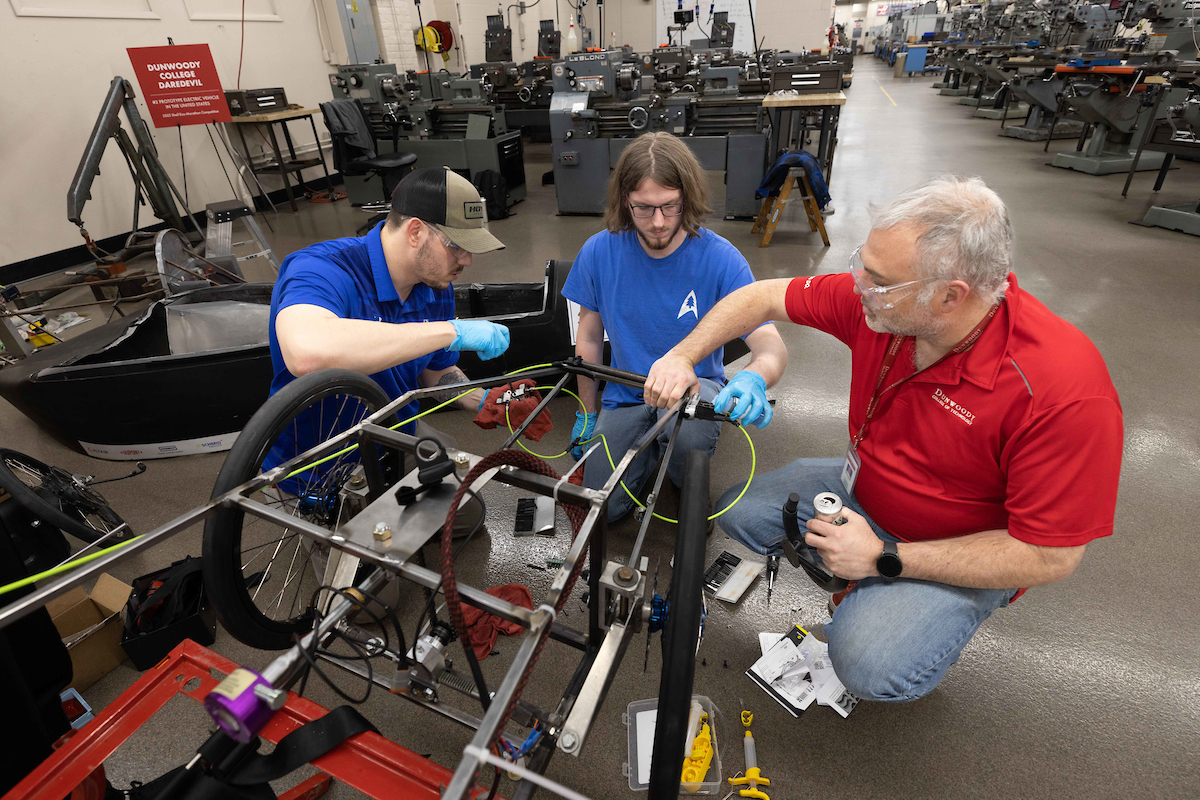Ready for more detail? Explore degree requirements, course descriptions, and program outcomes for Automation & Controls Engineering Technology in the College Catalog. You can also find a sample academic plan for each semester of your college journey.
Career Outcomes Rate
100%
Source 2023-24 Dunwoody Career Services Annual Report
Automation & Controls Engineering Technology
Become a Controls Engineer, Automation Engineer, or Mechatronics Engineer with a bachelor’s completion degree in Automation & Controls Engineering Technology.
82K
Average Salary: Robotics & Electronics, B.S.
Source 2023-24 Dunwoody Career Services Annual Report
Accredited by the Engineering Technology Accreditation Commission of ABET, https://www.abet.org, under the general criteria and the Instrumentation and Control Systems Engineering Technology program criteria.
+2 Years
Graduates earn a Bachelor of Science Degree
EVENING CLASSES ONLY
AND ON CAMPUS ONLY
Dunwoody Automation & Controls Engineering Technology Degree
Automated systems and controls are a fundamental part of modern life. They include any system that uses a sensor and then automatically makes adjustments to the system based on the data the sensor provides. That means everything from the automatic gate at a parking ramp to complex robot-driven manufacturing systems.
Dunwoody’s bachelor completion degree in Automation & Controls Engineering Technology is specifically for those looking to land engineering and management positions in the field.
As a completion degree, it provides a path to a four-year degree for graduates with two-year degrees in electrical maintenance, electronics, mechatronics, industrial controls, and robotics.
Students without a two-year degree who are interested in the most direct path the Bachelor of Science in Automation & Controls Engineering Technology should apply to Dunwoody’s Automated Systems & Robotics or Industrial Controls & Robotics programs.
Controls engineering combines a variety of disciplines, including electrical design, PLC (programmable logic controller) applications, robotics, motors, machine vision, auto-guided vehicles, and factory automation. Students in Dunwoody’s program take advanced coursework in each of those areas.
They also take classes in mathematics, physics, project management, and engineering so they develop the critical thinking, communication, and managerial skills required of the modern engineer.
Classes are lab-intensive so students can apply what they learn to real-world projects.
The program incorporates a senior capstone project in its final semester that gives students the chance to demonstrate industry-relevant controls engineering experience.
As part of the curriculum, students are also prepared to earn the following certifications:
- PMMI PLC 1 Certification
- PMMI PLC2 Certification
- A3 Certified Machine Vision Professional
Additional Information
Senior Capstone Projects

Automation & Controls Engineering Technology degree program earns accreditation
Dunwoody College of Technology’s Bachelor of Science degree program in Automation & Controls Engineering Technology has been accredited by the Engineering Technology Accreditation Commission of ABET, the quality assurance organization focused on college and university programs in the science, technology, engineering and math (STEM) disciplines.
Read MoreProfessional Licensure Information for Dunwoody Programs
Class topics include:
- Fundamentals of industrial automation
- Autonomous-Guided Vehicles (AGV)
- Advanced industrial controllers
- Engineering project management
- Using machine vision for automated inspection
- Supervisory Control & Data Acquisition (SCADA) systems
Common Job Titles
- Controls Engineer
- Automation Engineer
- Mechatronics Engineer
- PLC Programmer
- Robotics Engineer
- Application Engineer
- Process Engineer
- ECAD Designer
Facilities
Controls Engineering Lab
Assemble and program the industrial controls used in discrete manufacturing and advanced process control applications.
- 24 Allen Bradley L18ERM CompactLogix PLCs
- 24 Allen Bradley PanelView HMIs
- 24 Kinetix Motion Controllers
- 24 Powerflex VFDs
- 24 Cognex Machine Vision Systems
- Emerson Process Controls & Instrumentation
Programmable Controls Lab
Learn to debug and program programmable logic controllers for use in a variety of control systems.
- 11 Allen Bradley MicroLogix PLCs
- 11 Allen Bradley CompactLogix PLCs
- 11 Siemens S7-1200 PLCs
- 11 ABB VFDs
- 11 Maple Systems HMIs
Industrial Robotics Lab
Learn to wire and program industrial robots.
- 9 FANUC LR Mate Industrial Robots
- 10 Epson T3 SCARA Robots
- 8 UR3E Collaborative Robots
- 1 FANUC M1-iA Delta Robot
Basic Electricity Lab
Complete projects that help you learn the fundamentals of electricity, including how to analyze, design, build, and test series, parallel and combination AC and DC circuits.
- 12 Digital Oscilloscopes
- 12 DC power supplies and AC function generators
- 12 Elenco circuit prototyping stations
- 12 NIDA 130E Microprocessor trainers
- 1 LPKF S62 PCB Mill
